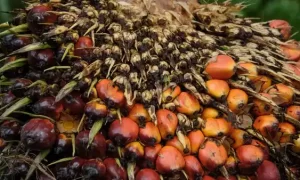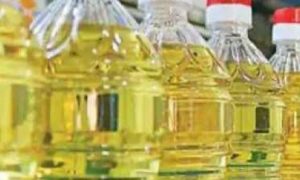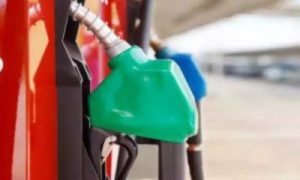TERI working on setting up domestic standards for biofuel blending in marine vessels, says Dr. Vibha Dhawan

India is prioritizing decarbonizing its ports and shipping sector, aiming to become a global maritime leader. The National Centre of Excellence in Green Port and Shipping, in collaboration with the Ministry of Ports, focuses on developing sustainable solutions, including biofuel blending and green hydrogen production. Efforts include partnering with international entities and promoting renewable energy within the maritime ecosystem.
NEW DELHI: Decarbonising India’s ports and shipping sector is one of the major focus areas of the Ministry of Ports, Shipping and Waterways, as India seeks to merge as a strong maritime power house globally. The Energy and Resources Institute’s National Centre of Excellence in Green Port and Shipping has been established in collaboration with the ministry for developing the regulatory framework and a roadmap for creating a green ecosystem around India’s ports and shipping sector.
Ahead of ET Infra’s ‘Global Ports and Shipping Summit’ Dr. Vibha Dhawan, Director General at The Energy and Resources Institute (TERI), in an interview outlined the role that the institute’s National Centre of Excellence in Green Port and Shipping will play in developing a green and sustainable ports and shipping sector in the country as well as the work underway for establishing domestic standards for biofuel blending in marine vessels.
If you could outline the nature of engagement with the Ministry of Ports, Shipping and Waterways and the role that the National Centre of Excellence in Green Port and Shipping will be playing?
With the Ministry of Ports, Shipping and Waterways, it is sort of a symbiotic association because they are the experts, they know their subject very well and we know how to bring in renewables and sustainability concepts into the country’s ports and shipping sector. Shipping is the cheapest mode of transportation and therefore in years to come when we are talking of global villages wherein we do not have to manufacture everything, the cross boundary movement of goods is going to be more frequent.
So with this background we held discussions with the ministry and that is how this idea of having a National Center of Excellence on Green Port and Shipping was conceived and we established it in March last year. So we are in that particular stage where some projects have been identified and we have started working on those projects. Some of the reports are near finalisation. We are also looking into international regulations very seriously because their impact on India and readiness of the country becomes extremely important.
If you could outline some aspects of the framework that the centre in TERI is currently working on or the focus areas?
TERI’s expertise lies in renewable energy. We are looking at the production of green hydrogen, apart from traditional renewable energy like solar, wind or hydro. We are looking into a roadmap for transition to cleaner and greener fuels for the country and for global maritime vessels.
TERI has to set up domestic standards for biofuel blending for marine vessels.
TERI is also looking into the entire value chain, whether much of raw material can be made available, in the first place. All these changes associated with utilisation of biofuel will need to be done without changing the ship’s engine design to a great extent. So we want right now to continue with the existing engines.
We also have to look into the current energy consumption and emission profiles of ports and then look into what is going to be the cost of transition and what are the new innovations that are being carried out. Turnaround time of ships along with better communication networks and logistic management, are also aspects which are essential. Possibility of giving incentives via ‘green credits’ is also being explored along with use of green shipping corridors.
Greening of bunkering fuel is going to be the foremost measure that countries globally will take. Incorporating biofuel into the ports and shipping ecosystem, how are those developments panning out?
Mixing of biofuels with existing bunkering fuel is going to be very easy. You really don’t have to even change anything. Now, what is the biggest problem in this case is do we have raw material?
The challenge with biofuel production today is whether we can produce the kind of quantities that are required at an affordable price and the same is going to be true with the shipping sector. Biofuel can be a reality today, provided we have the entire value chain availability of biofuel at an affordable price.
Globally, we are also looking into new fuels like hydrogen. Can existing fuel be replaced with it? For that to happen you really have to invest in new machinery, the entire design has to be changed.
Cochin Shipyard is taking a lead on that front. The development of indigenous hydrogen fuel cell catamaran ferry vessels by the shipyard, is remarkable. It reflects the country’s endeavour of making ports and shipping sector more environmentally friendly and sustainable.
What has been TERI’s engagement with the International Maritime Organisation which is working on sustainability and greening of international shipping? How has been India’s engagement with European countries?
Till now we haven’t had any direct contact with IMO. What we are trying to do is we are looking at their rules, their regulations in conjunction with the ministry. Whenever the ministry requires help from us with regard to IMO that is where TERI will get involved. We are not working directly with IMO at the moment.
In respect to engagement with European countries, Denmark has signed an Memorandum of Understanding with the Ministry of Ports, Shipping and Waterways focused on sustainable maritime practices. With Norway also we have very good relations and the technology that is with them, they are willing to share with us, they are willing to tell us what is happening. However, it is not all plug and play. If we look at Norway, they have more wind energy while we have more of solar energy. So even the onshore, offshore renewable energy potential of the two countries are different.

















